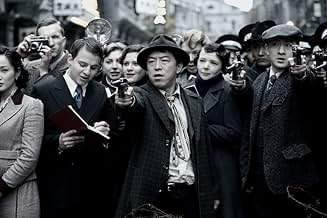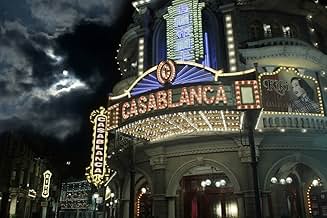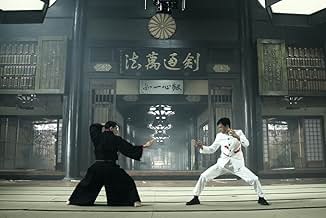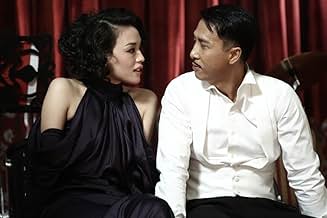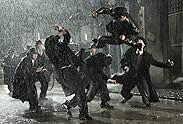AVALIAÇÃO DA IMDb
6,2/10
11 mil
SUA AVALIAÇÃO
O chineses Chen Zhen e seus amigos trabalhadores lutaram contra os alemães, como ajudantes dos aliados na guerra. Mas a China acabou invadida pelo Japão e quando eles retornam para seu país ... Ler tudoO chineses Chen Zhen e seus amigos trabalhadores lutaram contra os alemães, como ajudantes dos aliados na guerra. Mas a China acabou invadida pelo Japão e quando eles retornam para seu país pensam em uma maneira de ajudar a pátria.O chineses Chen Zhen e seus amigos trabalhadores lutaram contra os alemães, como ajudantes dos aliados na guerra. Mas a China acabou invadida pelo Japão e quando eles retornam para seu país pensam em uma maneira de ajudar a pátria.
- Direção
- Roteiristas
- Artistas
- Prêmios
- 4 indicações no total
Anthony Chau-Sang Wong
- Liu Yutian
- (as Anthony Wong)
Ryu Kohata
- Colonel Takeshi Chikaraishi
- (as Kohata Ryuichi)
Avaliações em destaque
Although the narrative gets convoluted at times, the historical setting of the Chinese labor corps sent to aid the allied war effort during world war 1 is historically factual ( http://en.wikipedia.org/wiki/Chinese_Labour_Corps ), though it has been largely forgotten.
the Chinese intelligentsia also successfully mounted pressure to cause Japan to delay full scale aggression until the 30s ( http://en.wikipedia.org/wiki/Twenty-One_Demands )
this movie is essentially a big budget hong kong action movie produced as a homage to Bruce Lee. At times it strives to be too many homages at once with Donnie Yen resurrecting both Kato AND Chen Zhen ( Fist of Fury).
It shouldn't be conceived as Chinese propaganda (anymore than any of the Bruce Lee movies were) or anti-Japanese, as long as you understand that the Chinese truly were the underdogs back then.
in fact, the young Japanese actor playing the colonel totally stole the show.
the Chinese intelligentsia also successfully mounted pressure to cause Japan to delay full scale aggression until the 30s ( http://en.wikipedia.org/wiki/Twenty-One_Demands )
this movie is essentially a big budget hong kong action movie produced as a homage to Bruce Lee. At times it strives to be too many homages at once with Donnie Yen resurrecting both Kato AND Chen Zhen ( Fist of Fury).
It shouldn't be conceived as Chinese propaganda (anymore than any of the Bruce Lee movies were) or anti-Japanese, as long as you understand that the Chinese truly were the underdogs back then.
in fact, the young Japanese actor playing the colonel totally stole the show.
Saw this at London preview.
This is a loose sequel to Bruce Lee's Fist of Fury. Its not important to know that but if you are a fan of Bruce Lee, you will enjoy Donny Yen's sometimes blatant impression of Bruce Lee's nuances and war cries. If you aren't familiar with Bruce Lee, than a certain fight sequence may look a bit bewildering! There is a fascinating story to be told here with some interesting sub plots and bizarrely evolving into a comic book superhero flick. Unfortunately, it makes for a complete mess. I wont totally blame the director for that, that's an editor's job to maintain a narrative flow. The potential is there for this to work but unfortunately it just seems to me that couldn't bind it all together, or they were in a hurry to complete the film because it all seemed rushed.
However, the film is sumptuous to watch in its period settings, and the 2 leads are charismatic enough to carry the film. There is a sprinkle of humour that gave me chuckles though some were unintentional.
But the real star of the film is Donny Yen. As he gets older, he has even more star presence than ever before and when he fights, you can always feel his punches and awesome kicks. The action scenes are adrenaline pumping, visceral, with a stylish visual flair. These alone are worth the price of admission.
I would watch this again, and maybe next time I can piece a few more pieces of the story together.
Overall, see it for the brilliance of Donny Yen action and if you actually followed the story and enjoyed it, then good for you!
This is a loose sequel to Bruce Lee's Fist of Fury. Its not important to know that but if you are a fan of Bruce Lee, you will enjoy Donny Yen's sometimes blatant impression of Bruce Lee's nuances and war cries. If you aren't familiar with Bruce Lee, than a certain fight sequence may look a bit bewildering! There is a fascinating story to be told here with some interesting sub plots and bizarrely evolving into a comic book superhero flick. Unfortunately, it makes for a complete mess. I wont totally blame the director for that, that's an editor's job to maintain a narrative flow. The potential is there for this to work but unfortunately it just seems to me that couldn't bind it all together, or they were in a hurry to complete the film because it all seemed rushed.
However, the film is sumptuous to watch in its period settings, and the 2 leads are charismatic enough to carry the film. There is a sprinkle of humour that gave me chuckles though some were unintentional.
But the real star of the film is Donny Yen. As he gets older, he has even more star presence than ever before and when he fights, you can always feel his punches and awesome kicks. The action scenes are adrenaline pumping, visceral, with a stylish visual flair. These alone are worth the price of admission.
I would watch this again, and maybe next time I can piece a few more pieces of the story together.
Overall, see it for the brilliance of Donny Yen action and if you actually followed the story and enjoyed it, then good for you!
Chen Zhen's first big-screen incarnation was the Bruce Lee classic "Fist of Legend" and forty years since then, the part of the fictional martial arts hero most famous for resisting the Japanese occupation of Shanghai has been played by many actors including Jet Li and Donnie Yen himself. The return of Donnie to the role since playing it in a 1995 ATV series shouldn't be surprising- after all, with both the Ip Man films and Bodyguards and Assassins, Donnie has been at the forefront of a recent wave of Hong Kong-China big-budget co-productions with strong Chinese nationalistic sentiment.
True to the character's origins, this latest entry into the Chen Zhen mythology trades heavily in chest-thumping patriotism. Chen Zhen/ Donnie Yen's enemies are once again the Japanese- this time in glitzy 1920s Shanghai, an era when the city was divided along the lines of different expatriate factions. The Japanese though were the most ambitious and aggressive, eager to take advantage of a disunited China to conquer the motherland. While an offshore and offscreen naval campaign was ongoing, their strategy in Shanghai was to target locals and foreigners opposed to their plan of expansion.
Donning a black suit and mask, Chen Zhen takes it upon himself to stop the wave of assassinations sweeping the city. Comparisons to Jet Li's Black Mask (1996) and The Green Hornet are inevitable, but Andrew Lau's story of the avenging hero bears even more resemblance to Batman, seeing as how Chen Zhen gets help from Huang Bo's local police constable (a la Commissioner Gordon). Lau's film however refuses to rest easy on one genre, eager to exploit its historical backdrop to deliver an old- fashioned thriller.
And so his Shanghai is one abound with Japanese spies, even in wealthy businessman Liu Yiutian's (Anthony Wong) flashy nightclub Casablanca where Chen Zhen hangs out to observe the politicking among the Westerners and the Japanese. Lau uses the tension between the various camps to keep up a fair amount of intrigue throughout the film, especially as Chen Zhen's underground resistance movement struggles to keep ahead of the stronger and more organised Japanese forces.
Amidst the suspense, the script by no less than four writers (including producer Gordon Chan) also throws in a love story between Chen Zhen and nightclub singer Kiki (Shu Qi), but the addition that was supposed to provide emotional payoff falls far short. So too the relationships between the other characters in the film- whether Chen Zhen's bond with his sister and his compatriots, or his friendship with Liu Yutian. Indeed, these interactions are given short shrift, and Lau fails to delineate them as much as he fails in fleshing out the various characters.
That is a problem especially for Chen Zhen, whose motivations for leading the resistance- other than teaching the Japanese that "Chinese are not the sick men of Asia"- aren't exactly clear. It is also tricky because the audience is not led to feel the level of indignation as Chen Zhen is supposed to, the kind of indignation that made the Ip Man films so satisfying to watch at the end- so the climax between Chen Zhen and an entire dojo of Japanese students and their master just doesn't turn out as emotionally rewarding as one would expect it to.
Those looking for Donnie Yen to kick ass should also lower their expectations. Unlike the Ip Man films, Donnie doesn't get much time here to show off his agility and prowess- thanks to Lau's frenetic efforts to develop a script chock full of undercooked subplots. That is a pity, because one would certainly like to see more of the fast, furious and lethal action that Donnie has on display during the breathtaking opening sequence (to whet your appetite, Chen Zhen uses bayonet knives to take out a section of enemy soldiers on the second floor of a building, running at a 30-degree angle up a pole, and then using the knives to scale up the wall). There are just two more big action setpieces after this before the finale, but what visceral excitement Donnie generates in both is extinguished far too quickly.
For what he falls short in the martial arts sequences, Andrew Lau tries to make up for in flashy visuals and lush cinematography. As with his other films, the director who started out as an acclaimed cinematographer takes up lensing duties here and his photography of 1920s Shanghai is grand and opulent. Nevertheless, most audiences would probably prefer to see Donnie Yen's fighting than Lau's gorgeous cinematography, and will find the latter inadequate compensation for the former.
Fans of Donnie Yen however should still find reason to rejoice. Chen Zhen sees Donnie Yen at his most suave and charismatic (even looking convincingly like he can play a piano). He is also a much better actor now, and the dramatic scenes possess none of the awkwardness that used to dwarf his earlier films. Perhaps most importantly, the exhilarating action sequences show that he has lost none of his mettle as the best martial arts star in Chinese cinema right now. For a younger generation who may not have seen Bruce Lee and his nanchucks in the original "Fist of Legend", Donnie Yen's take on Chen Zhen is iconic enough to leave a lasting impression.
True to the character's origins, this latest entry into the Chen Zhen mythology trades heavily in chest-thumping patriotism. Chen Zhen/ Donnie Yen's enemies are once again the Japanese- this time in glitzy 1920s Shanghai, an era when the city was divided along the lines of different expatriate factions. The Japanese though were the most ambitious and aggressive, eager to take advantage of a disunited China to conquer the motherland. While an offshore and offscreen naval campaign was ongoing, their strategy in Shanghai was to target locals and foreigners opposed to their plan of expansion.
Donning a black suit and mask, Chen Zhen takes it upon himself to stop the wave of assassinations sweeping the city. Comparisons to Jet Li's Black Mask (1996) and The Green Hornet are inevitable, but Andrew Lau's story of the avenging hero bears even more resemblance to Batman, seeing as how Chen Zhen gets help from Huang Bo's local police constable (a la Commissioner Gordon). Lau's film however refuses to rest easy on one genre, eager to exploit its historical backdrop to deliver an old- fashioned thriller.
And so his Shanghai is one abound with Japanese spies, even in wealthy businessman Liu Yiutian's (Anthony Wong) flashy nightclub Casablanca where Chen Zhen hangs out to observe the politicking among the Westerners and the Japanese. Lau uses the tension between the various camps to keep up a fair amount of intrigue throughout the film, especially as Chen Zhen's underground resistance movement struggles to keep ahead of the stronger and more organised Japanese forces.
Amidst the suspense, the script by no less than four writers (including producer Gordon Chan) also throws in a love story between Chen Zhen and nightclub singer Kiki (Shu Qi), but the addition that was supposed to provide emotional payoff falls far short. So too the relationships between the other characters in the film- whether Chen Zhen's bond with his sister and his compatriots, or his friendship with Liu Yutian. Indeed, these interactions are given short shrift, and Lau fails to delineate them as much as he fails in fleshing out the various characters.
That is a problem especially for Chen Zhen, whose motivations for leading the resistance- other than teaching the Japanese that "Chinese are not the sick men of Asia"- aren't exactly clear. It is also tricky because the audience is not led to feel the level of indignation as Chen Zhen is supposed to, the kind of indignation that made the Ip Man films so satisfying to watch at the end- so the climax between Chen Zhen and an entire dojo of Japanese students and their master just doesn't turn out as emotionally rewarding as one would expect it to.
Those looking for Donnie Yen to kick ass should also lower their expectations. Unlike the Ip Man films, Donnie doesn't get much time here to show off his agility and prowess- thanks to Lau's frenetic efforts to develop a script chock full of undercooked subplots. That is a pity, because one would certainly like to see more of the fast, furious and lethal action that Donnie has on display during the breathtaking opening sequence (to whet your appetite, Chen Zhen uses bayonet knives to take out a section of enemy soldiers on the second floor of a building, running at a 30-degree angle up a pole, and then using the knives to scale up the wall). There are just two more big action setpieces after this before the finale, but what visceral excitement Donnie generates in both is extinguished far too quickly.
For what he falls short in the martial arts sequences, Andrew Lau tries to make up for in flashy visuals and lush cinematography. As with his other films, the director who started out as an acclaimed cinematographer takes up lensing duties here and his photography of 1920s Shanghai is grand and opulent. Nevertheless, most audiences would probably prefer to see Donnie Yen's fighting than Lau's gorgeous cinematography, and will find the latter inadequate compensation for the former.
Fans of Donnie Yen however should still find reason to rejoice. Chen Zhen sees Donnie Yen at his most suave and charismatic (even looking convincingly like he can play a piano). He is also a much better actor now, and the dramatic scenes possess none of the awkwardness that used to dwarf his earlier films. Perhaps most importantly, the exhilarating action sequences show that he has lost none of his mettle as the best martial arts star in Chinese cinema right now. For a younger generation who may not have seen Bruce Lee and his nanchucks in the original "Fist of Legend", Donnie Yen's take on Chen Zhen is iconic enough to leave a lasting impression.
excerpt, more at my location - One is an acclaimed director, the other an ever-growing martial arts man-of-the-moment. Their source material is Bruce Lee's finest hour. How does this first collaboration between Andrew Lau and Donnie Yen shape up?
That the film is not especially emotionally involving is a surprise when one considers who is at the helm. Andrew Lau is responsible for some of the more visceral and engaging moments in recent Hong Kong popular cinema (consider his Young And Dangerous movies, or the original Infernal Affairs), but here he shows an oddly clumsy hand with character and emotion.
Given the talent involved, it was not unreasonable to expect something of a classic. This is far from it, but its set-pieces still contain more genuine imagination and excitement than is likely to be found anywhere else - especially in the thrilling prologue sequence, which prompts hope from this reviewer that, someday soon, the conscripted Chinese soldiers in World War One get the cinematic tribute they truly deserve.
That the film is not especially emotionally involving is a surprise when one considers who is at the helm. Andrew Lau is responsible for some of the more visceral and engaging moments in recent Hong Kong popular cinema (consider his Young And Dangerous movies, or the original Infernal Affairs), but here he shows an oddly clumsy hand with character and emotion.
Given the talent involved, it was not unreasonable to expect something of a classic. This is far from it, but its set-pieces still contain more genuine imagination and excitement than is likely to be found anywhere else - especially in the thrilling prologue sequence, which prompts hope from this reviewer that, someday soon, the conscripted Chinese soldiers in World War One get the cinematic tribute they truly deserve.
Imagine that an amateur screenwriter shat out a vomit draft and said, "That's Oscar-worthy!" Well, that pretty much describes this mumbled action flick.
In fairness, the script - or final cut - could have been messed up by anyone, so I won't blame the writer, but as an espionage-cum-action thriller, the film is a total dud.
If you're a fan of Donnie Yen (like me!), you'll watch this regardless of how bad anyone tells you it is, and where the big fight at the end nets it an extra star, please don't let the 4/10 fool you into believing that this is half-way decent, because it really is one of the worst Donnie films I've sat through. Which is a shame, because Shu Qi looks as gorgeous as ever and really pours a lot of emotion into her role... which only further highlights how badly the final film lets down both of its main stars.
In fairness, the script - or final cut - could have been messed up by anyone, so I won't blame the writer, but as an espionage-cum-action thriller, the film is a total dud.
If you're a fan of Donnie Yen (like me!), you'll watch this regardless of how bad anyone tells you it is, and where the big fight at the end nets it an extra star, please don't let the 4/10 fool you into believing that this is half-way decent, because it really is one of the worst Donnie films I've sat through. Which is a shame, because Shu Qi looks as gorgeous as ever and really pours a lot of emotion into her role... which only further highlights how badly the final film lets down both of its main stars.
Você sabia?
- CuriosidadesThe film featured two actors who had portrayed Ip Man. Donnie Yen played the character in the "Ip Man" trilogy and Anthony Chau-Sang Wong played him in Ip Man: The Final Fight (2013).
- Erros de gravaçãoThe original movie The Green Hornet is mentioned in the movie, while it is part of the homage to Bruce Lee, the movie came out in 1940, 15 years after the movie takes place.
- ConexõesFeatured in At the Movies: Venice Film Festival 2010 (2010)
Principais escolhas
Faça login para avaliar e ver a lista de recomendações personalizadas
- How long is Legend of the Fist: The Return of Chen Zhen?Fornecido pela Alexa
Detalhes
- Data de lançamento
- Países de origem
- Centrais de atendimento oficiais
- Idiomas
- Também conhecido como
- Legend of the Fist: The Return of Chen Zhen
- Empresas de produção
- Consulte mais créditos da empresa na IMDbPro
Bilheteria
- Faturamento bruto nos EUA e Canadá
- US$ 50.433
- Fim de semana de estreia nos EUA e Canadá
- US$ 11.365
- 24 de abr. de 2011
- Faturamento bruto mundial
- US$ 27.390.678
- Tempo de duração
- 1 h 46 min(106 min)
- Cor
- Mixagem de som
- Proporção
- 2.35 : 1
Contribua para esta página
Sugerir uma alteração ou adicionar conteúdo ausente







